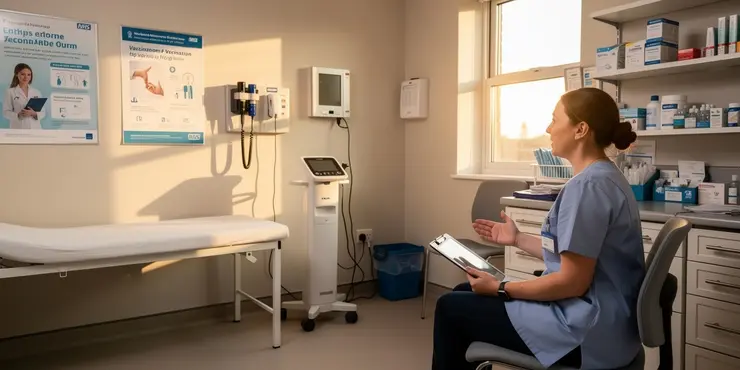
Find Help
More Items From Ergsy search
-
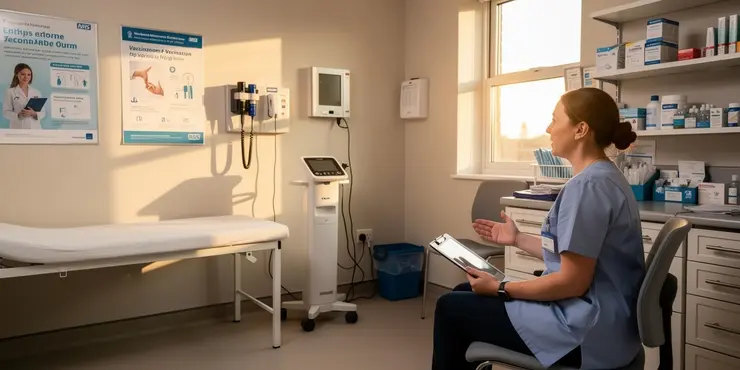
Latest Advice on Managing Respiratory Illnesses During Flu Season
Relevance: 100%
-
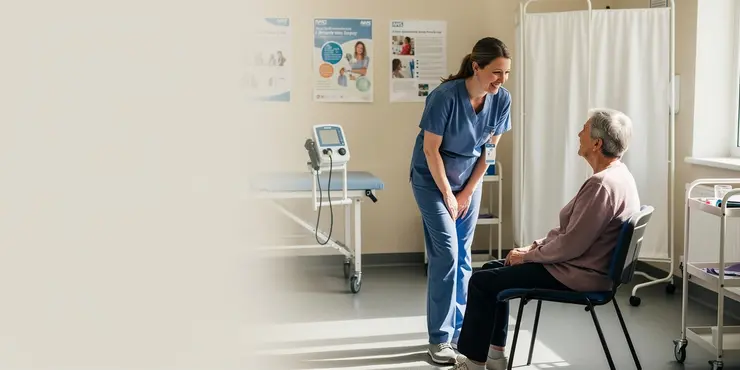
UK Sees Surge in Respiratory Illnesses as Weather Cools
Relevance: 72%
-
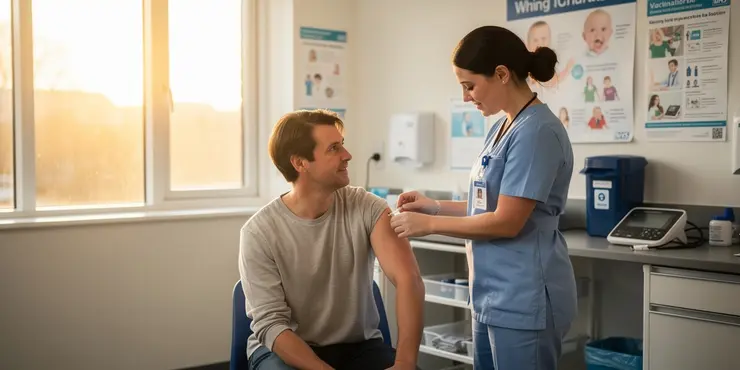
Is flu season going to be bad in 2026?
Relevance: 72%
-

Understanding and Managing Respiratory Illnesses in Families
Relevance: 66%
-
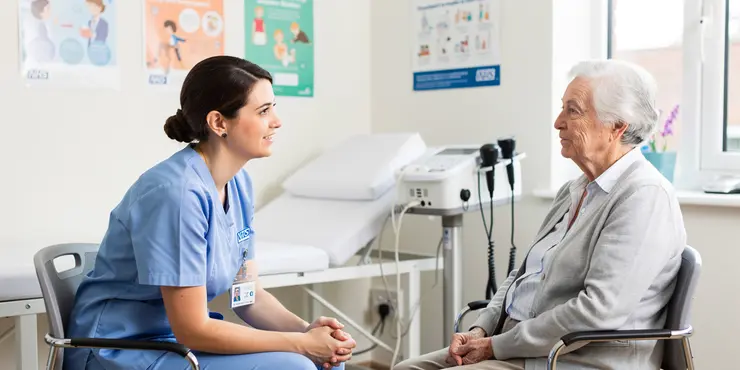
Understanding Seasonal Flu: Prevention and Treatment
Relevance: 64%
-
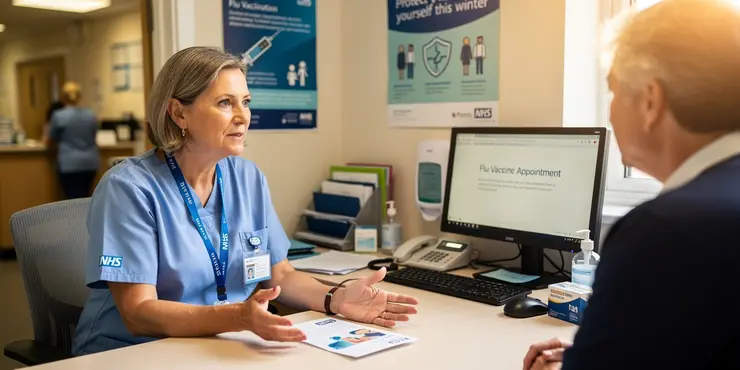
Will climate change affect the 2026 flu season?
Relevance: 61%
-

Why does H3N2 often lead to more severe flu seasons?
Relevance: 61%
-
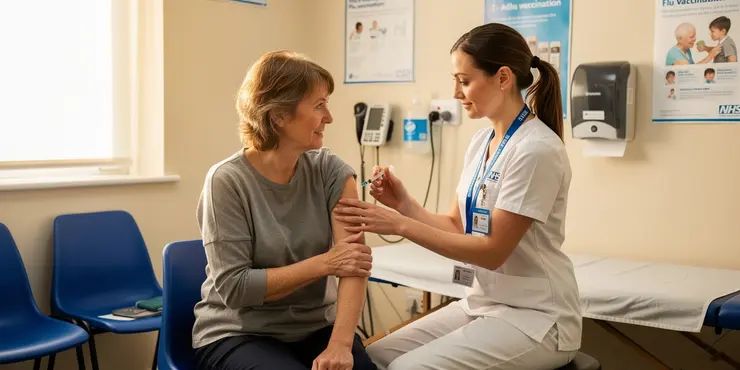
What factors determine if the flu season will be bad in 2026?
Relevance: 59%
-
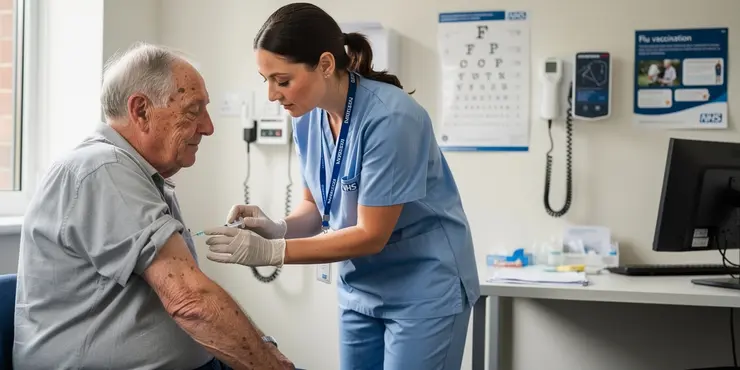
Are certain populations more at risk during the 2026 flu season?
Relevance: 59%
-
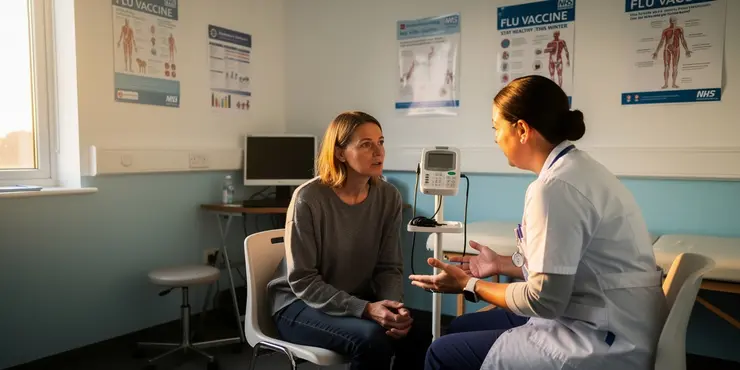
When does the H3N2 flu season typically occur?
Relevance: 57%
-
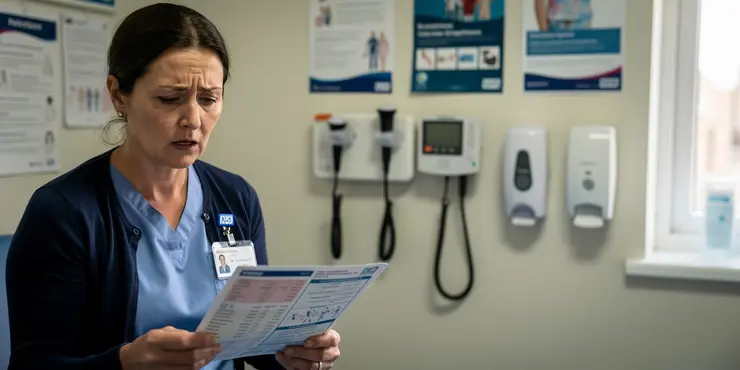
What is the H3N2 flu strain?
Relevance: 52%
-
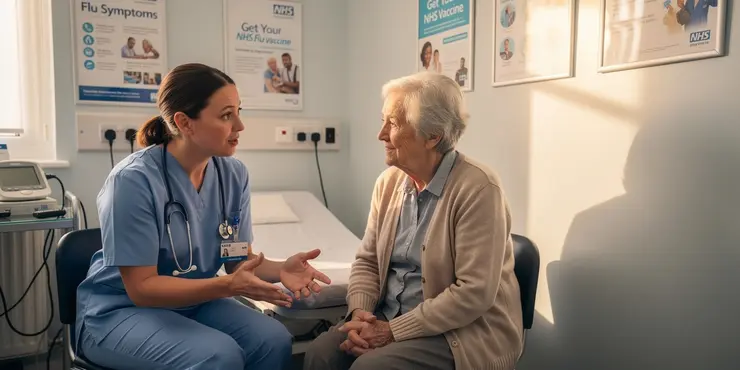
Flu can be fatal
Relevance: 51%
-
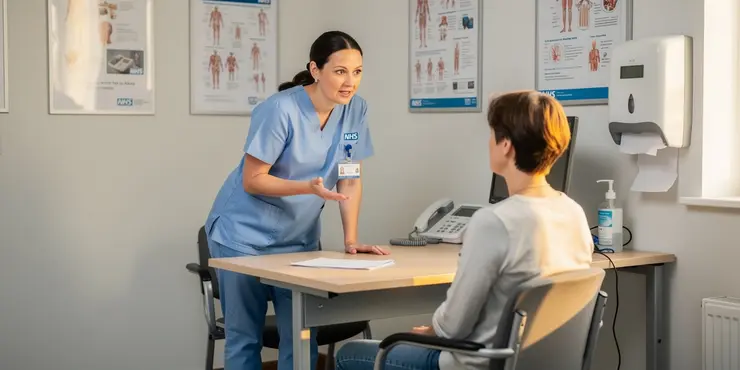
Is Super Flu a new strain of virus?
Relevance: 50%
-
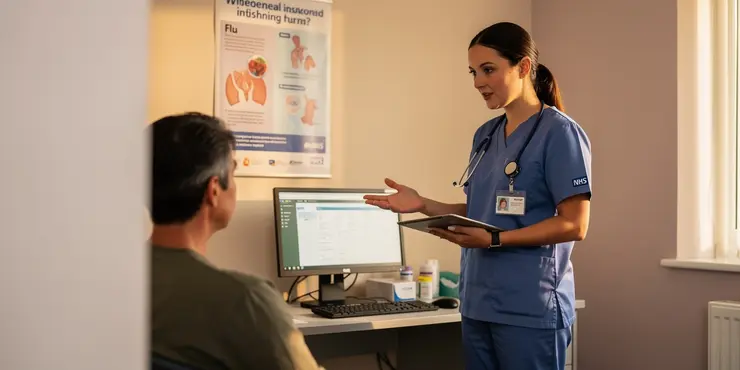
Symptoms of flu (influenza)
Relevance: 48%
-
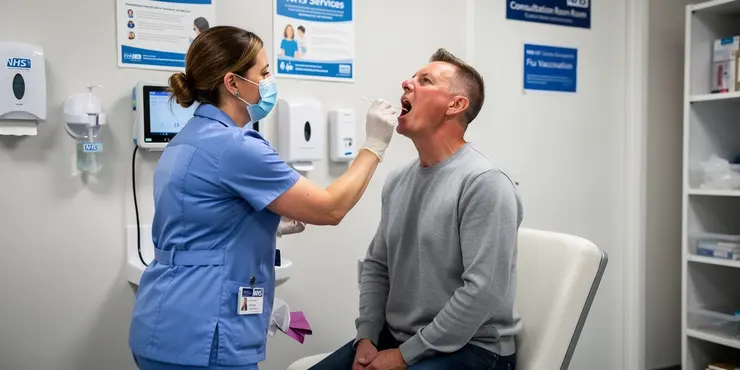
How is Super Flu diagnosed?
Relevance: 48%
-

Who should get the flu vaccine in the UK?
Relevance: 46%
-

How effective is the flu vaccine?
Relevance: 46%
-
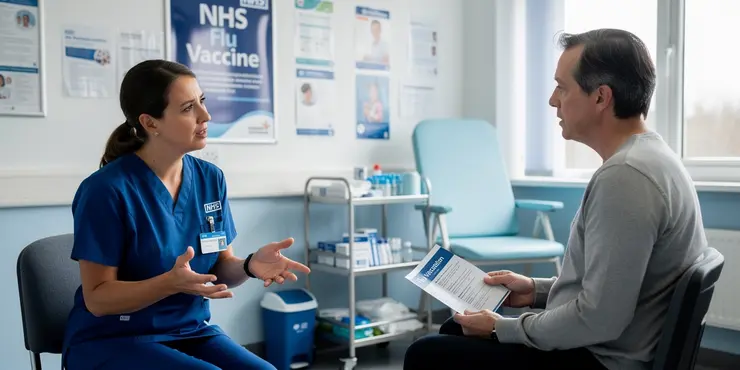
Can I still get the flu if I have been vaccinated?
Relevance: 45%
-
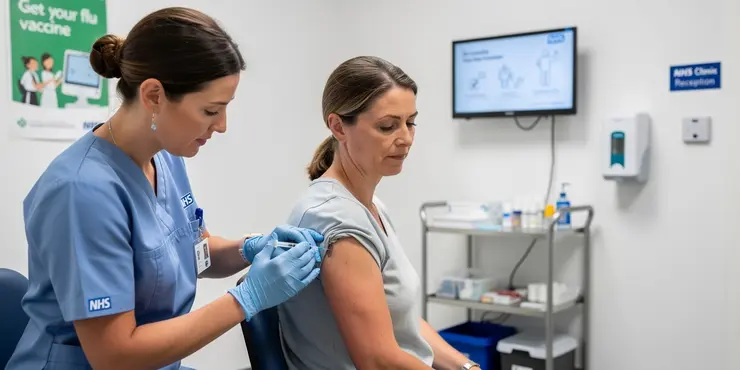
Can the flu vaccine give me the flu?
Relevance: 45%
-
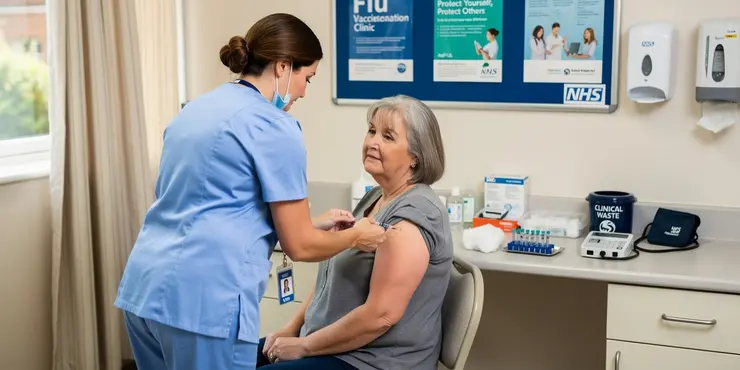
How does the winter flu jab work?
Relevance: 44%
-
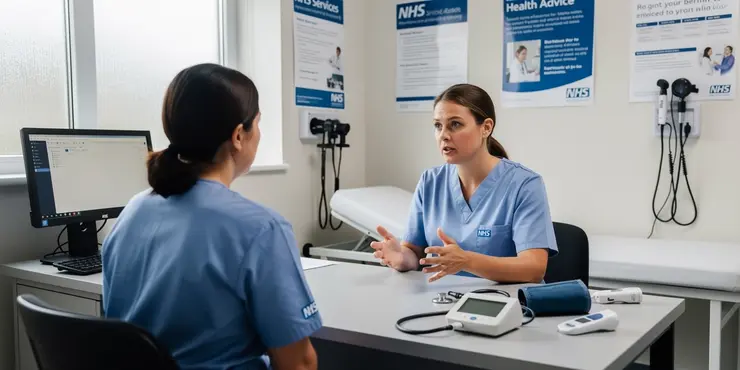
Is the Super Flu contagious?
Relevance: 44%
-

Current Flu Vaccination Recommendations and Availability
Relevance: 44%
-
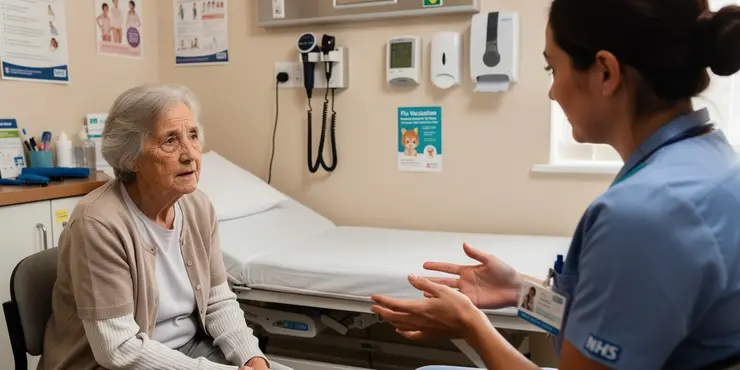
Who is most at risk from Super Flu?
Relevance: 44%
-
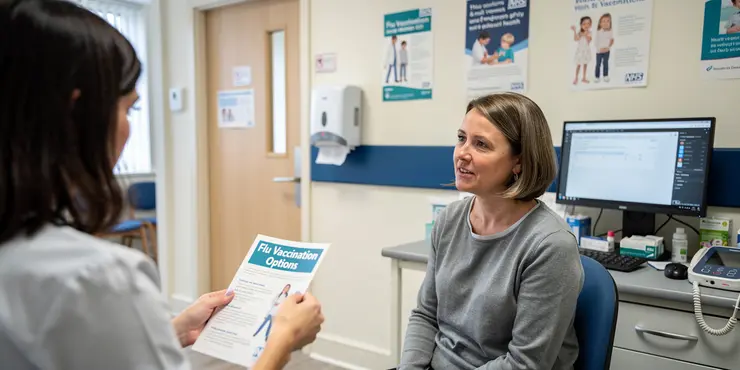
Can Super Flu cause a pandemic?
Relevance: 44%
-
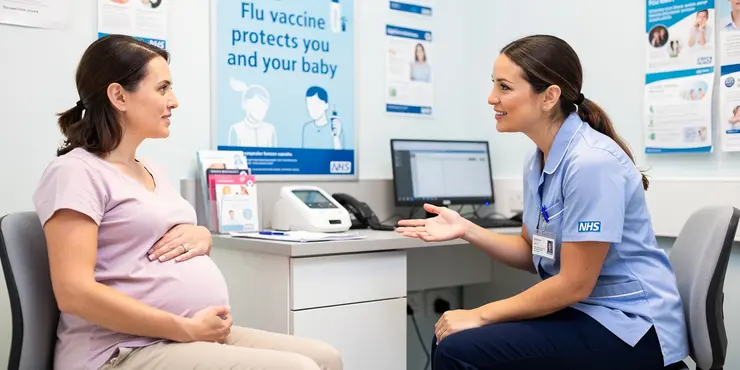
Can pregnant women get the flu vaccine?
Relevance: 44%
-

How important is it to get a flu vaccine in 2026?
Relevance: 44%
-
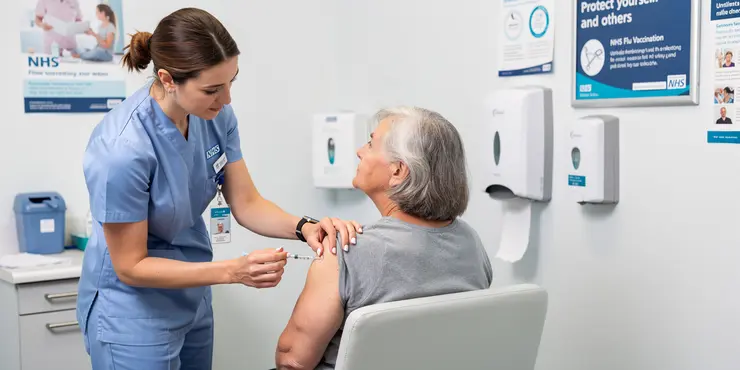
Will getting the flu jab protect me against COVID-19?
Relevance: 43%
-
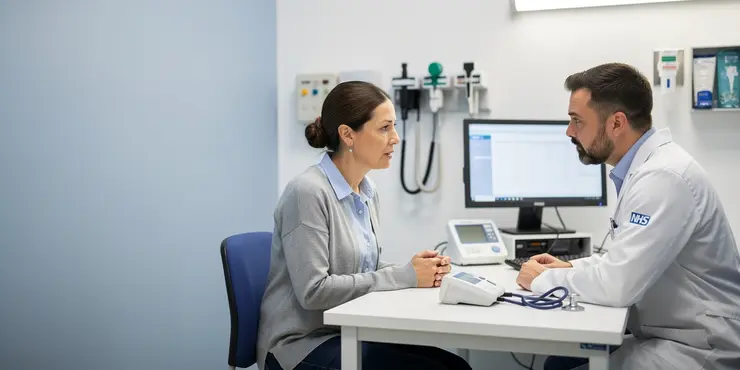
What are the symptoms of Super Flu?
Relevance: 43%
-

How long does protection from the flu jab last?
Relevance: 43%
-

What is the winter flu jab?
Relevance: 43%
-
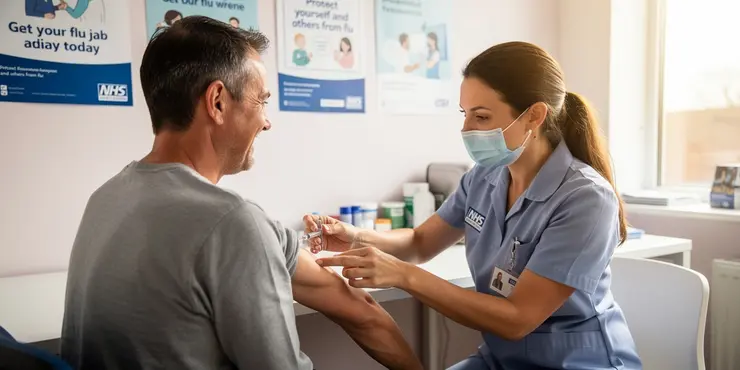
Can the flu vaccine give you the flu?
Relevance: 42%
-
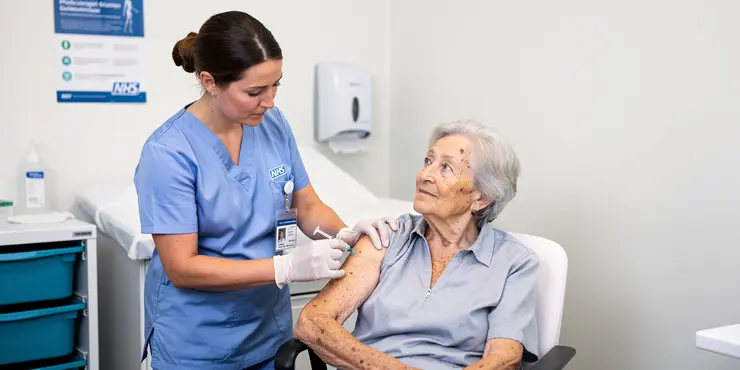
Can the flu jab give you the flu?
Relevance: 42%
-

Is the winter flu jab effective against all flu strains?
Relevance: 42%
-
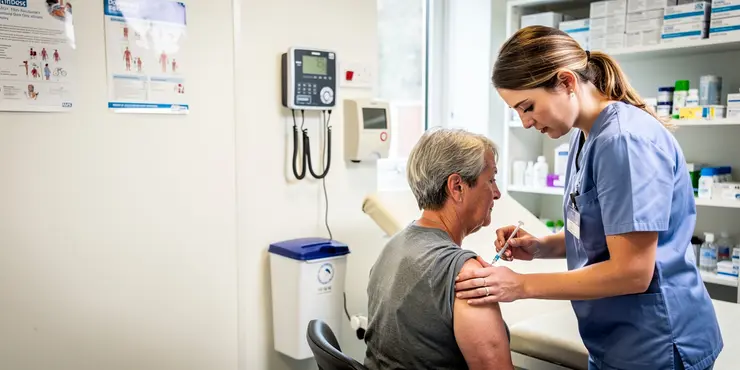
When is the best time to get the flu jab?
Relevance: 42%
-
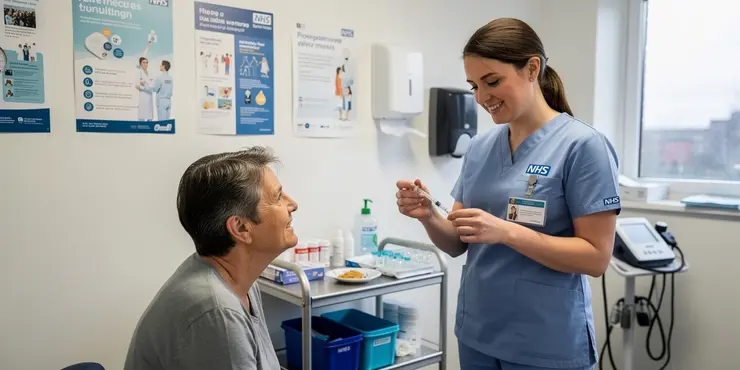
Is the flu vaccine free for everyone in the UK?
Relevance: 42%
-
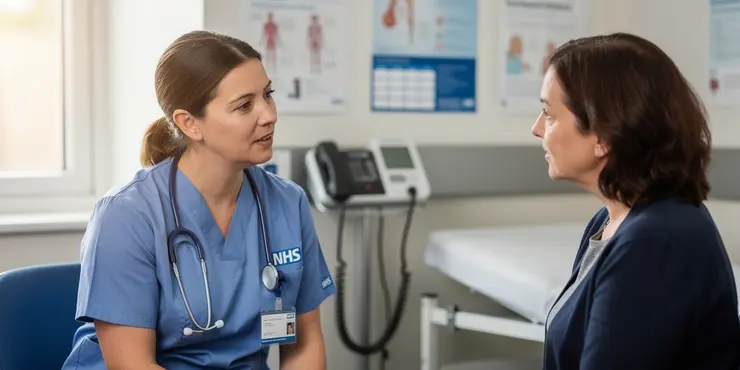
Is H3N2 more dangerous than other flu strains?
Relevance: 42%
-
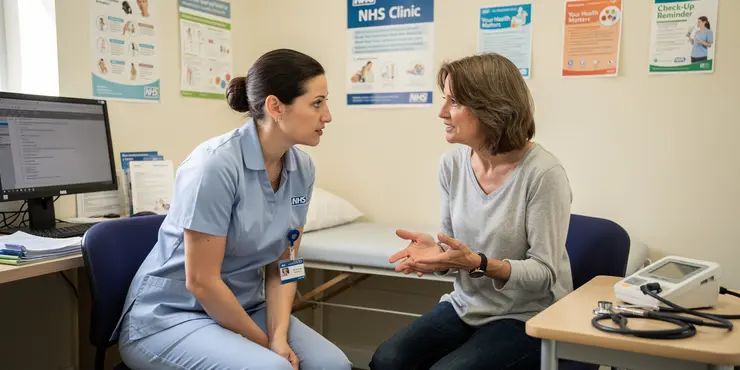
What are the symptoms of H3N2 flu?
Relevance: 41%
-
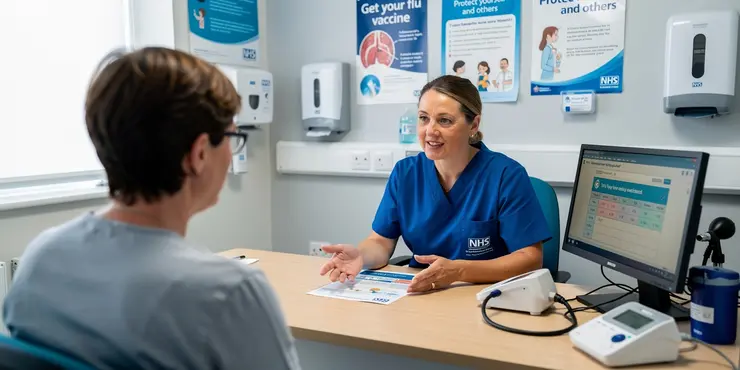
Can Super Flu be prevented by vaccines?
Relevance: 41%
-
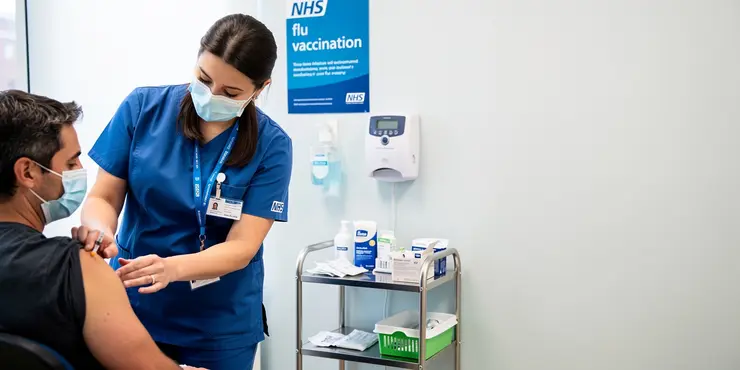
How long does it take for the flu jab to become effective?
Relevance: 41%
-

When is the best time to get the winter flu jab?
Relevance: 39%
Latest Advice on Managing Respiratory Illnesses During Flu Season
Understanding Flu Symptoms
During flu season, it’s crucial to be aware of the symptoms of respiratory illnesses, including the flu. Common symptoms include a sudden fever, chills, cough, sore throat, runny or stuffy nose, muscle aches, fatigue, and headaches. Differentiating between flu symptoms and those of common colds can aid in appropriate treatment and prevention measures.
Vaccination Recommendations
Getting vaccinated is one of the most effective ways to protect yourself and others from respiratory illnesses during flu season. The NHS recommends receiving the flu vaccine annually, particularly for older adults, pregnant women, young children, and individuals with chronic health conditions. The vaccine not only reduces the risk of flu but can also alleviate the severity of symptoms if you do catch the virus.
Practising Good Hygiene
Maintaining good hygiene practices is essential in reducing the spread of respiratory illnesses. Wash your hands regularly with soap and water for at least 20 seconds, especially after coughing, sneezing, or touching potentially contaminated surfaces. Using an alcohol-based hand sanitiser can be an alternative when soap and water are not available. Additionally, avoid touching your face, particularly the nose, mouth, and eyes, to minimise the risk of infection.
Maintaining a Healthy Lifestyle
Boosting your immune system can help you better fight off respiratory illnesses. A healthy lifestyle includes a balanced diet rich in fruits and vegetables, regular exercise, adequate hydration, and sufficient sleep. It’s also important to manage stress levels, as chronic stress can weaken the immune system.
Seeking Medical Advice
If you experience severe flu symptoms, including difficulty breathing, chest pain, sudden dizziness, or persistent vomiting, it is essential to seek medical advice promptly. The NHS website provides resources and guidance on when to seek medical attention. For mild symptoms, managing at home with rest, fluids, and over-the-counter medications might be sufficient.
Staying Informed and Prepared
Stay updated with the latest information from reliable sources such as the NHS, Public Health England, and the World Health Organisation (WHO). Being informed about the prevalence of flu in your area, new strains, and additional vaccination clinics can help you stay ahead. Having essential medical supplies at home, such as a thermometer, pain relievers, and tissues, can also be beneficial.
Conclusion
By following these latest pieces of advice on managing respiratory illnesses during flu season, you can protect yourself and those around you. Staying vigilant, practising good hygiene, keeping healthy, and seeking timely medical advice are key components in navigating flu season effectively in the United Kingdom.
Latest Advice on Dealing with Breathing Illnesses During Flu Season
Understanding Flu Symptoms
When it's flu season, it's important to know the signs of breathing illnesses like the flu. Common signs are a fast fever, feeling cold, cough, sore throat, runny or blocked nose, muscle pain, feeling very tired, and headaches. Knowing the difference between flu signs and cold signs can help with getting the right treatment.
Getting the Flu Vaccine
Getting a flu shot is a good way to stay safe from breathing illnesses in flu season. The NHS suggests getting a flu shot every year, especially for older people, pregnant women, young kids, and those with long-term health issues. The shot helps stop the flu and can make symptoms less hard if you get sick.
Keeping Clean
Being clean is very important to stop breathing illnesses from spreading. Wash your hands with soap and water for 20 seconds. Do this after you cough, sneeze, or touch things that might be dirty. If there’s no soap, use hand gel with alcohol. Don't touch your face, like your nose, mouth, and eyes, to avoid getting sick.
Staying Healthy
Being healthy helps fight off breathing illnesses. Eat a balanced diet with lots of fruits and vegetables. Exercise, drink enough water, and get enough sleep. Keep stress low because too much stress can make you sick.
Getting Medical Help
See a doctor if you have bad flu signs, like trouble breathing, chest pain, feeling really dizzy, or throwing up a lot. Look at the NHS website for when to see a doctor. If your signs are not too bad, resting at home, drinking fluids, and using some medicines you can buy at the store might be enough.
Stay Informed and Ready
Keep up with news from good sources like the NHS, Public Health England, and the World Health Organisation (WHO). Know about flu in your area, new flu types, and extra vaccine places. Have some things at home, like a thermometer, painkillers, and tissues.
Conclusion
By following this advice for flu season, you can keep yourself and others safe. Be aware, keep clean, stay healthy, and see a doctor when needed. These steps help you get through flu season safely in the UK.
Frequently Asked Questions
What are the most common respiratory illnesses during flu season?
The most common respiratory illnesses during flu season include the flu (influenza), the common cold, respiratory syncytial virus (RSV), and sometimes bacterial infections like bronchitis and pneumonia.
How can I tell the difference between a cold and the flu?
Colds usually come on gradually and are typically milder, with symptoms like a runny nose, sore throat, and cough. The flu comes on suddenly with more severe symptoms such as high fever, body aches, fatigue, and severe cough.
Should I get the flu vaccine, and when is the best time to get it?
Yes, getting the flu vaccine is highly recommended. The best time to get the flu vaccine is in the autumn, before flu season starts, ideally by the end of October.
Can the flu vaccine give me the flu?
No, the flu vaccine cannot give you the flu. It is made from inactivated virus, meaning it cannot cause the illness.
What are the main symptoms of COVID-19, and how do they differ from the flu?
Common symptoms of COVID-19 include a persistent cough, high temperature, loss of taste or smell, and fatigue. While there is overlap with flu symptoms, loss of taste or smell is more specific to COVID-19.
How can I protect myself from respiratory illnesses during flu season?
You can protect yourself by getting vaccinated, washing your hands frequently, avoiding close contact with sick individuals, wearing masks in crowded places, and maintaining good hygiene practices.
What should I do if I have flu symptoms?
If you have flu symptoms, stay home to avoid spreading the virus, drink plenty of fluids, rest, and take over-the-counter medications to alleviate symptoms. Contact your GP if symptoms are severe or if you are in a high-risk group.
Are there any antiviral medications for treating the flu?
Yes, antiviral medications like oseltamivir (Tamiflu) and zanamivir (Relenza) can be prescribed to treat the flu, but they are most effective if taken within the first 48 hours of symptom onset.
Can wearing a mask help prevent respiratory infections?
Yes, wearing a mask can help reduce the spread of respiratory infections, especially in indoor and crowded spaces.
Is it safe to get the flu vaccine and COVID-19 vaccine at the same time?
Yes, it is safe to receive both the flu vaccine and COVID-19 vaccine at the same time. The NHS recommends getting both vaccines to maximize protection.
How do I know if I need to see a doctor for my respiratory illness symptoms?
You should see a doctor if you have difficulty breathing, chest pain, persistent high fever, severe headache, symptoms lasting more than 10 days, or if you are in a high-risk group.
What is the best way to treat a common cold?
The best way to treat a common cold includes resting, staying hydrated, taking over-the-counter cold medications, using saline nasal sprays, and drinking warm fluids to soothe the throat.
Can herbal remedies or supplements prevent the flu?
There is limited evidence that herbal remedies or supplements can prevent the flu. The most effective way to prevent the flu is by getting vaccinated and following good hygiene practices.
What should I do if someone in my household has a respiratory illness?
If someone in your household has a respiratory illness, encourage them to rest, drink fluids, and isolate as much as possible. Clean frequently touched surfaces regularly, wash your hands often, and avoid close contact.
How long should I stay home if I have the flu?
You should stay home for at least 24 hours after your fever has gone without the use of fever-reducing medications to avoid spreading the virus to others.
What breathing sicknesses happen a lot during flu season?
During flu season, lots of people get sick with illnesses that affect their breathing. These are called breathing sicknesses. Here are some of the common ones:
- Flu: This is a virus that makes you feel very sick with a high fever, cough, and body aches.
- Cold: This is less serious than the flu but can make your nose runny, and give you a sore throat and cough.
- Bronchitis: This is when your lungs get swollen and irritated, making you cough a lot.
- Pneumonia: This is a serious infection in the lungs that makes it hard to breathe.
To help understand this information better, you can:
- Use pictures to learn what each sickness looks like.
- Ask someone to read this with you and explain any words you don't know.
- Watch videos about these sicknesses for more information.
During cold and flu season, many people get sick. The most common illnesses that affect breathing are: the flu, the common cold, a virus called RSV, and sometimes infections like bronchitis and pneumonia.
If you find reading hard, try using tools that turn words into speech, like a text-to-speech app.
How can I know if I have a cold or the flu?
A cold and the flu are both illnesses that can make you feel sick.
Here is how you can tell them apart:
- Cold: You might have a runny nose, sneezing, and a sore throat. You may feel a bit unwell, but you can still do things.
- Flu: The flu is stronger. You might have a fever, feel very tired, and have muscle aches. It's harder to do your usual activities.
If you are not sure, ask an adult to help you. They can talk to a doctor or use health websites. A thermometer can help check if you have a fever.
Colds start slowly. They are not too bad. You might have a runny nose, a sore throat, and a cough. The flu starts quickly and feels much worse. You might have a high fever, your body might hurt, you might feel very tired, and have a bad cough.
Should I get the flu shot, and when is the best time to get it?
Getting a flu shot can help keep you healthy. It stops you from getting the flu. The best time to get the shot is before flu season starts. This is usually in the fall. Ask your doctor if you need help deciding.
Talk to a friend or family for support. They can help you remember your appointment.
Yes, it is a good idea to get the flu shot. The best time to get your flu shot is in the fall, before the flu spreads around. Try to get it by the end of October.
Can the flu shot make me sick with the flu?
No, the flu shot can't make you sick with the flu. The virus in the shot is dead, so it can't make you feel ill.
What are the main signs of COVID-19, and how are they different from the flu?
COVID-19 and the flu can make you feel sick. Here are some signs of COVID-19:
- High temperature
- Bad cough
- Feeling very tired
Signs of the flu are similar but can include:
- Fast start of feeling sick
- Chills and being very cold
- Body aches and pains
If you are not sure, talk to a grown-up or doctor.
You can also ask someone you trust to help you read and understand more.
COVID-19 can make you feel sick in some ways. You might have a cough that won't go away. You could also have a high fever. Sometimes people can't taste or smell things. You may also feel very tired. These signs are a bit like the flu, but if you can't taste or smell, it might be COVID-19.
How can I stay healthy and not get sick from the flu?
You can keep yourself safe by doing these things:
- Get your vaccine.
- Wash your hands a lot.
- Stay away from people who are sick.
- Wear a mask when it’s crowded.
- Keep clean and tidy.
What to do if you feel sick with the flu?
If you feel sick with flu symptoms, here are some easy things to do:
- Stay at home and rest. This helps your body get better.
- Drink lots of water or juice. It keeps you from getting too thirsty.
- Ask an adult to give you medicine for fever or aches.
- Use tissues to cover your mouth when you cough or sneeze.
- Wash your hands a lot to stop germs from spreading.
If you feel very sick, ask an adult to take you to the doctor.
Here are some helpful tools:
- Ask someone to read to you if you find reading hard.
- Use pictures or drawings if that helps you understand better.
- Talk to someone who can explain things in a simple way.
If you feel like you have the flu, it is best to stay home. This way, you won’t give the flu to other people. Drink lots of water or juice, and get plenty of rest. You can also take medicine from the store to help with how you feel. If you feel very sick or are worried, call your doctor for advice. This is important if you are someone who needs extra care.
Is there medicine to help with the flu?
Yes, doctors can give you medicine like oseltamivir (also called Tamiflu) and zanamivir (also called Relenza) to help with the flu. They work best if you start taking them within the first two days after you start feeling sick.
Do masks help stop getting sick?
Yes, wearing a mask can help stop the spread of germs. This is important, especially when you are inside or around lots of people.
Can I get the flu and COVID-19 vaccines together safely?
Yes, it is safe. You can get them on the same day. Getting both vaccines helps keep you healthy.
Tips to Remember:
- Tell the nurse or doctor if you feel unwell.
- Relax your arm before the shot.
- Drink water after your vaccines.
You can ask a friend or family member to come with you for support.
Yes, it is okay to get both the flu shot and the COVID-19 shot at the same time. The NHS says it is a good idea to get both shots to keep you safe.
When should I see a doctor for breathing problems?
Ask for help if you:
- Find it hard to breathe
- Have pain when you breathe
- Have a cough that won't go away
- Feel very tired
Use pictures or videos to help you understand. A trusted friend or family member can go with you to the doctor.
Go to the doctor if you have trouble breathing, chest pain, a fever that won’t go away, a bad headache, if you feel sick for more than 10 days, or if you are at high risk.
How can you feel better when you have a cold?
Here are some simple ways to help you feel better:
- Rest: Try to sleep and relax.
- Drink: Have lots of water or juice.
- Stay Warm: Use a blanket or wear a sweater.
- Eat: Have warm soup or light meals if you can.
- Meds: Ask a grown-up for medicine, like cough syrup.
Tools that can help:
- Picture cards: These can show you what to do.
- Timer: Use this to remind you to drink water.
If you have a common cold, here’s how to feel better:
- Get lots of rest (sleeping and taking it easy).
- Drink lots of water.
- You can take medicine from the store to help with your cold.
- Use a nasal spray with salt to help your nose.
- Drink warm drinks like tea to make your throat feel better.
Can herbs or pills stop the flu?
Sometimes, people use herbs or special pills to try and stop the flu. We don't know if these work. It is important to be careful.
It is a good idea to talk to a doctor before using them.
Washing hands and getting a flu shot can help stop the flu.
Pictures can help you learn more about staying healthy.
We don't know for sure if herbal medicines or supplements can stop the flu. The best way to stop the flu is to get a flu shot and keep clean.
What to Do if Someone at Home is Sick with Breathing Problems
Do you live with someone who is sick and having trouble breathing? Here is how you can help:
- Keep away from the sick person as much as you can.
- Wash your hands with soap and water often.
- Make sure they drink lots of water.
- If they get worse, call a doctor. Use the phone or video if you can.
- Let in fresh air by opening a window.
Try using pictures, videos, or ask someone you trust to help if you are not sure what to do. Always ask a grown-up or a helper for guidance.
If someone in your home is sick with a cold or cough, tell them to rest and drink plenty of water. They should stay away from others as much as they can. Clean things that people touch a lot, like doorknobs. Wash your hands a lot, and try not to get too close to the sick person.
How long should I stay home if I have the flu?
If you have the flu, stay home for at least 24 hours after your fever is gone. This means your temperature is normal without needing medicine.
It's important to rest and drink lots of water.
Tell an adult if you need help or feel worse.
You can use a thermometer to check your fever.
Wash your hands often to keep germs from spreading.
You should stay home until your fever is gone for one whole day. Do not use medicine to lower your fever. This helps to keep others safe from the virus.
Useful Links
This website offers general information and is not a substitute for professional advice.
Always seek guidance from qualified professionals.
If you have any medical concerns or need urgent help, contact a healthcare professional or emergency services immediately.
Some of this content was generated with AI assistance. We’ve done our best to keep it accurate, helpful, and human-friendly.
- Ergsy carfully checks the information in the videos we provide here.
- Videos shown by Youtube after a video has completed, have NOT been reviewed by ERGSY.
- To view, click the arrow in centre of video.
- Most of the videos you find here will have subtitles and/or closed captions available.
- You may need to turn these on, and choose your preferred language.
- Go to the video you'd like to watch.
- If closed captions (CC) are available, settings will be visible on the bottom right of the video player.
- To turn on Captions, click settings .
- To turn off Captions, click settings again.
More Items From Ergsy search
-

Latest Advice on Managing Respiratory Illnesses During Flu Season
Relevance: 100%
-

UK Sees Surge in Respiratory Illnesses as Weather Cools
Relevance: 72%
-

Is flu season going to be bad in 2026?
Relevance: 72%
-

Understanding and Managing Respiratory Illnesses in Families
Relevance: 66%
-

Understanding Seasonal Flu: Prevention and Treatment
Relevance: 64%
-

Will climate change affect the 2026 flu season?
Relevance: 61%
-

Why does H3N2 often lead to more severe flu seasons?
Relevance: 61%
-

What factors determine if the flu season will be bad in 2026?
Relevance: 59%
-

Are certain populations more at risk during the 2026 flu season?
Relevance: 59%
-

When does the H3N2 flu season typically occur?
Relevance: 57%
-

What is the H3N2 flu strain?
Relevance: 52%
-

Flu can be fatal
Relevance: 51%
-

Is Super Flu a new strain of virus?
Relevance: 50%
-

Symptoms of flu (influenza)
Relevance: 48%
-

How is Super Flu diagnosed?
Relevance: 48%
-

Who should get the flu vaccine in the UK?
Relevance: 46%
-

How effective is the flu vaccine?
Relevance: 46%
-

Can I still get the flu if I have been vaccinated?
Relevance: 45%
-

Can the flu vaccine give me the flu?
Relevance: 45%
-

How does the winter flu jab work?
Relevance: 44%
-

Is the Super Flu contagious?
Relevance: 44%
-

Current Flu Vaccination Recommendations and Availability
Relevance: 44%
-

Who is most at risk from Super Flu?
Relevance: 44%
-

Can Super Flu cause a pandemic?
Relevance: 44%
-

Can pregnant women get the flu vaccine?
Relevance: 44%
-

How important is it to get a flu vaccine in 2026?
Relevance: 44%
-

Will getting the flu jab protect me against COVID-19?
Relevance: 43%
-

What are the symptoms of Super Flu?
Relevance: 43%
-

How long does protection from the flu jab last?
Relevance: 43%
-

What is the winter flu jab?
Relevance: 43%
-

Can the flu vaccine give you the flu?
Relevance: 42%
-

Can the flu jab give you the flu?
Relevance: 42%
-

Is the winter flu jab effective against all flu strains?
Relevance: 42%
-

When is the best time to get the flu jab?
Relevance: 42%
-

Is the flu vaccine free for everyone in the UK?
Relevance: 42%
-

Is H3N2 more dangerous than other flu strains?
Relevance: 42%
-

What are the symptoms of H3N2 flu?
Relevance: 41%
-

Can Super Flu be prevented by vaccines?
Relevance: 41%
-

How long does it take for the flu jab to become effective?
Relevance: 41%
-

When is the best time to get the winter flu jab?
Relevance: 39%


